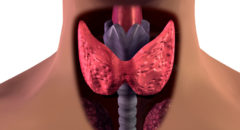
If you have hypothyroidism, you have an underactive thyroid gland. The thyroid is not able to make enough thyroid hormone for normal bodily function. Even though the thyroid is a small butterfly-shaped gland in the base of the neck, it affects your energy, metabolism, temperature regulation, and even your brain and heart.
There is no evidence that eating or avoiding certain foods can improve thyroid function or reverse hypothyroidism, however your diet can make your symptoms worse or even interfere with your medications.
1. Iodine
You need adequate amounts of iodine in your diet for normal thyroid function. In the developed world, we get enough iodine in iodized salt, seafood, and dairy products. Therefore, if you have a healthy, balanced diet, there is no need to take additional iodine supplements. In fact, too much iodine can lead to hyperthyroidism or hypothyroidism in some cases.
2. Soy
There is also a concern that isoflavones, found in soy can cause hypothyroidism but research has shown this to only be the case if you are iodine deficient. However, foods high in soy such as tofu, miso, soymilk can decrease the absorption of your thyroid medication. You should wait at least four hours after taking your thyroid pill before consuming soy-based foods.
3. Cruciferous Vegetables
Foods such as Brussels sprouts, cabbage, cauliflower, and broccoli can also interfere with thyroid hormone production if you have hypothyroidism and iodine deficiency. These foods prevent the thyroid from using iodine to make thyroid hormone. People with hypothyroidism can still enjoy these foods in moderation as they have other health benefits.
4. Gluten
One of the most common causes of hypothyroidism is an autoimmune condition called Hashimoto’s thyroiditis. These patients are at risk of having other autoimmune disorders such as celiac disease. In celiac disease, the immune system attacks the small intestine in the presence of gluten, which is found in foods processed from wheat, barley, and rye.
If you are diagnosed with celiac disease, gluten can lead to inflammation of the small intestine and interfere with thyroid hormone replacement medication. Even if you don’t have celiac disease, you should discuss with your doctor if you can eliminate gluten to see if your symptoms improve.
5. Coffee
Even black coffee can block the absorption of your thyroid medication and lead to erratic blood levels. It’s, therefore, crucial to take your thyroid medication with water on an empty stomach and wait at least 30 minutes before eating or enjoying your morning cup of coffee.
6. Medications
Some common medications can also impair the absorption of thyroid medication. These include iron and calcium supplements and multivitamins containing them. They should be taken four hours after taking your thyroid pill. Other medications include antacids, acid blockers, and some cholesterol-lowering drugs such as cholestyramine.
7. Biotin
Biotin, found in many hair and nail supplements does not affect thyroid hormone production but can interfere with the measurement of thyroid hormone in the lab, making your results inaccurate. You should, therefore, stop taking Biotin for at least a week before you go in for thyroid lab testing.
 Physician, Health and Wellness expert, Coach, Author, and Speaker! Dr. Kelly Wood, MD is board-certified in Internal Medicine as well as Endocrinology, Diabetes, and Metabolism. Beyond the stethoscope, Dr. Kelly is recognized as “The Bounce Back Coach,” helping high-performing women to bounce back from failed relationships, rebuild their self-esteem, and reclaim their identity. Follow me on social media @drkellywoodmd or connect with me at [email protected]
Physician, Health and Wellness expert, Coach, Author, and Speaker! Dr. Kelly Wood, MD is board-certified in Internal Medicine as well as Endocrinology, Diabetes, and Metabolism. Beyond the stethoscope, Dr. Kelly is recognized as “The Bounce Back Coach,” helping high-performing women to bounce back from failed relationships, rebuild their self-esteem, and reclaim their identity. Follow me on social media @drkellywoodmd or connect with me at [email protected]








